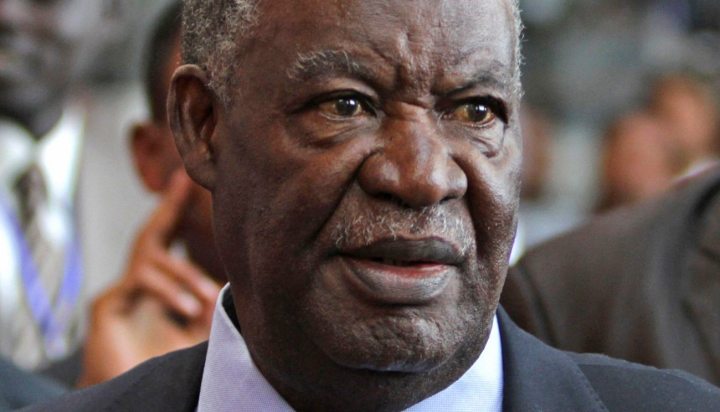Africa
Analysis: Zambia’s ‘self-indulgent’ fight for gay rights

It’s been a bad few months for gay rights in Zambia, with virulent anti-gay rhetoric from public figures being matched by the arrests of a gay rights activist and two men accused of “unnatural” and illegal sex. Ironically, the negative international headlines generated by all this might force the Zambian government to rethink its views. By SIMON ALLISON.
Big in the South African news last week was Zambian vice-president Guy Scott’s derogatory comments aimed at South Africa and South Africans. He doesn’t like us very much, and he made that abundantly clear – and we spent the rest of the week trying to figure out if he had a point or not.
Largely overlooked in the hubbub was the rest of Scott’s interview, which was just as undiplomatic. He spoke of his admiration for Robert Mugabe, complained about his government’s image and also outlined how important he considers the fight for gay rights – that is, not important at all in the grand scheme of things.
“I think you’ve got so much cleaning up to do of killings and defilements and this and that, it’s almost self-indulgent to think, ‘Well, why don’t we sit here and talk about gay rights?’,” he said, speaking to the Guardian’s David Smith. “It’s indulgent politics that assumes yes, we don’t actually have 7 million unemployed people. Realistically, I think even an average gay, if you gave him a list of all the concerns Zambia had, would not necessarily put gay rights on top.”
I don’t know if either James Mwansa or Philip Mubiana count as the “average gay”, but I imagine they might have a different opinion. The 21-year-old men were arrested earlier this week after neighbours reported them to the police. They had been living together for some time and were, apparently, indulging in “unnatural sex”. After being released on bail, they were arrested just a few hours later after they had more “carnal knowledge of each other against the order of nature”.
They’ve now been charged with four counts of sodomy, a crime under Zambian law which carries a sentence of up to 14 years in prison. The pair pleaded not guilty on all counts. At the packed plea hearing, a jeering crowd shouted insults at the pair and tried to take pictures of the men.
The case of Mwansa and Mubiana does not exactly conform to the “live and let live” approach to gay rights which Guy Scott described later in the interview. In fact, it’s another symptom of what appears to be growing institutional discrimination against homosexuality.
In April, Paul Kasonkomona, a prominent human rights activist, was arrested shortly after giving an interview on live TV in which he called for homosexuality to be decriminalised. He’s been charged with “inciting the public to take part in indecent activities”.
Meanwhile, the number of homophobic statements made by politicians and religious leaders has been on the rise. Take this from traditional leader Chief Madzimawe of the Ngoni: “It is not a culture of Zambians, Africans and Ngonis to practise homosexuality and gay people should be caged.”
The apparent decline of respect for gay rights in Zambia has not gone unnoticed by international civil society organisations.
“The arrest of the two men solely for their real or perceived sexual orientation amounts to discrimination and it is in violation of their rights to freedom of conscience, expression, and privacy,” said Simeon Mawanza, Amnesty International’s Zambia researcher. “Laws criminalising homosexuality and gender identity criminalise the legitimate exercise of these human rights, which are protected in treaties ratified by Zambia, including the International Covenant on Civil and Political Rights and the African Charter on Human and Peoples’ Rights.”
Richard Lee from the Open Society Initiative for Southern African was even blunter. “It is a shocking turn of events – but sadly not surprising. Zambia’s record on human rights has taken a hammering in recent months as the government of President Michael Sata has cracked down relentlessly on opposition politicians and civil society activists… It is also another sign – a big flashing neon sign – that Zambia is rapidly sliding down the path marked ‘Malawi under Bingu’, where an increasingly authoritarian government supported by a repressive police force trampled over human rights, democracy, good governance and the rule of law.”
The Malawi comparison is illustrative. Zambia’s smaller neighbour made global headlines when it jailed a gay couple for 14 years after they held a public engagement ceremony, but there were consequences: Malawi’s repression of gay rights was one of the reasons cited by aid groups which withdrew aid money from the country, contributing to an economic collapse from which it is only just recovering.
The Zambian government too relies on aid – over $1.5 billion of it a year, according to rough calculations. That’s a fair chunk of change, and something the country can ill-afford to lose. It will be interesting to see if vice-president Scott still thinks that gay rights are “self-indulgent” when the big donors start threatening to pull their funding. DM
Read more:
- Zambia urged to release two men charged with same-sex sexual conduct from Amnesty International
- Drama at Kapiri court as ‘gays’ appear for plea from the Times of Zambia
Photo: Zambia’s President Michael Sata speaks to journalists at the 18th African Union (AU) summit in Ethiopia’s capital Addis Ababa January 30, 2012. REUTERS/Noor Khamis


















 Become an Insider
Become an Insider